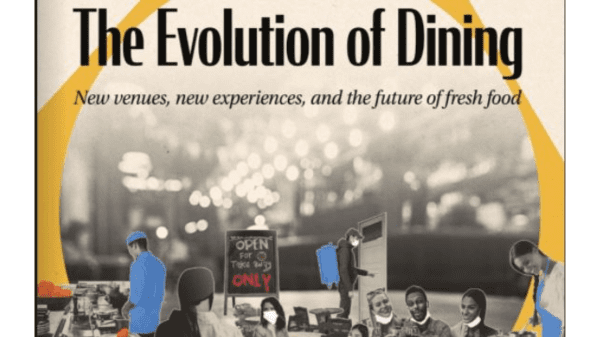Well before Covid took the air out of the foodservice industry last spring, operators began turning to ‘ghost kitchens’ to try new concepts while minimizing investment and risk.
With the growth of Grubhub and DoorDash climbing 300 percent faster than dine-in over the last five years, according to the Upserve Restaurant Insider website, the need for brick-and-mortar locations has fallen.
In a ghost kitchen, both established and new, virtual brands are produced for delivery. To illustrate the new symbiosis between foodservice and the omnipresence of delivery apps, Travis Kalanick, who founded Uber, founded Cloud Kitchens in Los Angeles, where operators can focus on producing food while orders and delivery are separate, streamlined functions.
Jill Overdorf, director of business development for Naturipe Farms BB #:165382, LLC in Salinas, CA, enthuses, “Ghost kitchens are a killer concept, and they’ll continue. They reduce overhead and fixed expenses and enable shared resources while also reducing labor.”
Joe Lavoie, general manager of Richmond, BC-based Neptune Fresh Produce Inc. BB #:334248 agrees.
“When Covid hit, many operators lacked a developed takeout system and were forced into it. Now it’s 40 percent of their business,” he says. “With ghost kitchens, smaller, multiunit groups can open a distant kitchen to serve farther-away customers, which expands their footprint via delivery, increasing opportunities.”
A case in point is the iconic delicatessen Canter’s, a fixture since 1931 in the mid-city Fairfax neighborhood of Los Angeles. Its alliance with Kitchen United allows the deli to deliver pastrami sandwiches and matzo ball soup from Pasadena to downtown Los Angeles and Santa Monica, a distance of over 25 miles.
Canter’s is in the company of many restaurant concepts including Japanese, Mexican, Mediterranean, burgers, salads, and vegetarian, all of which rely on Kitchen United to fulfill customer cravings and expand their businesses through the sprawling Los Angeles area.
In Canada, Ghost Kitchen Brands has partnered with Walmart to bring an assortment of restaurant concepts to its big box stores. Meals are freshly prepared in a single kitchen, and customers can order in-store and online for pickup or delivery via apps such as Uber Eats.
Patrons can choose from more than 20 popular brands including Saladworks, Beyond Meat, Cheesecake Factory Bakery, Pepe’s Perogies, Rocky’s Italian, Amaya Indian Street Food, Taco del Mar, Crêpe Delicious, and Ben & Jerry’s, with plans for more to be added.
Natalie Shmulik, CEO of The Hatchery, a food business incubator and service provider in Chicago, sums it up this way: “Whatever you call them, ghost/cloud/dark kitchens are here to stay. There’s room for improvement, but since trial and error is built into the model, more chefs will use ghost kitchens as an outlet to test new concepts and to offer more accessible dishes without compromising their brick-and-mortar brands.”
This is an excerpt from the cover story of the July/August 2021 issue of Produce Blueprints Magazine. Click here to read the whole issue.



